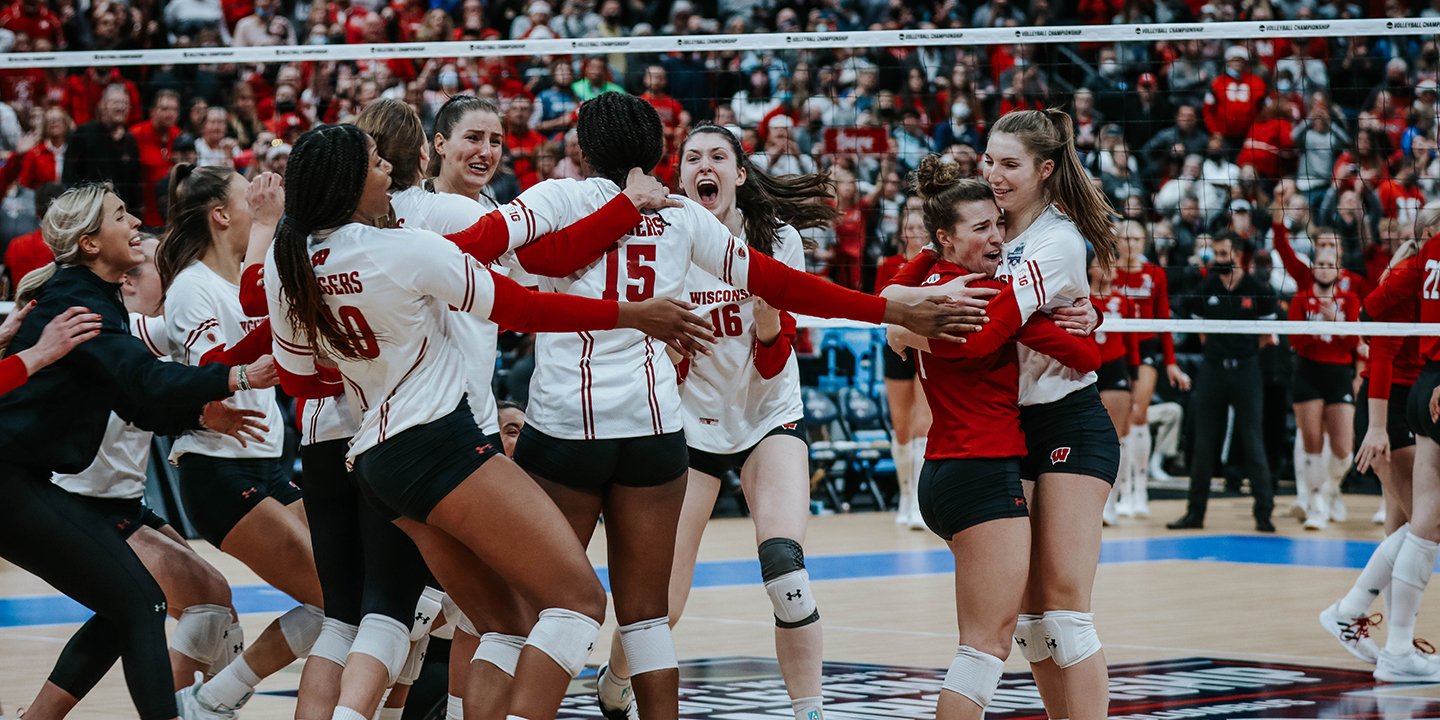
Badgers at the Buzzer!
Legendary UW sporting events that came down to the wire
The first University of Wisconsin sporting event I witnessed in person was the home football opener at Camp Randall Stadium in September 1965. The University of Colorado was the opponent. I was nine. My dad took me. I envisioned amazing runs and spectacular receptions, punctuated by end zone celebrations.
The final score was 0–0. The Janesville Daily Gazette called it “about as uninteresting a game as has been seen in Camp Randall in some years.”
It was a down time for UW football. Fortunately, in the half-century since, Badger athletes — men and women, in every sport — have provided thrills aplenty in contests that get talked about for years. Here are six that came down to the wire.
Mens’ Hockey vs. Cornell University
Boston Garden, Boston — March 16, 1973
The Badgers dug themselves a huge hole in the early stages of this NCAA semifinal game. Cornell was up 4–0 four minutes into the second period, but Dean Talafous ’74, a star UW sophomore, insists he wasn’t worried.
“Bob Johnson’s teams did not have a mentality where they would fall apart or lose confidence because of the score,” says Talafous, referencing the legendary UW head coach. “I never thought we were going to lose. I just played shift by shift. We had the fans behind us.”
Some 1,500 Badger fans made the trip to Boston, and for the first time at a road hockey game the UW Marching Band was there as well, playing countless renditions of “You’ve Said It All.”
The Badgers closed the gap to 4–2 at the end of the second period.
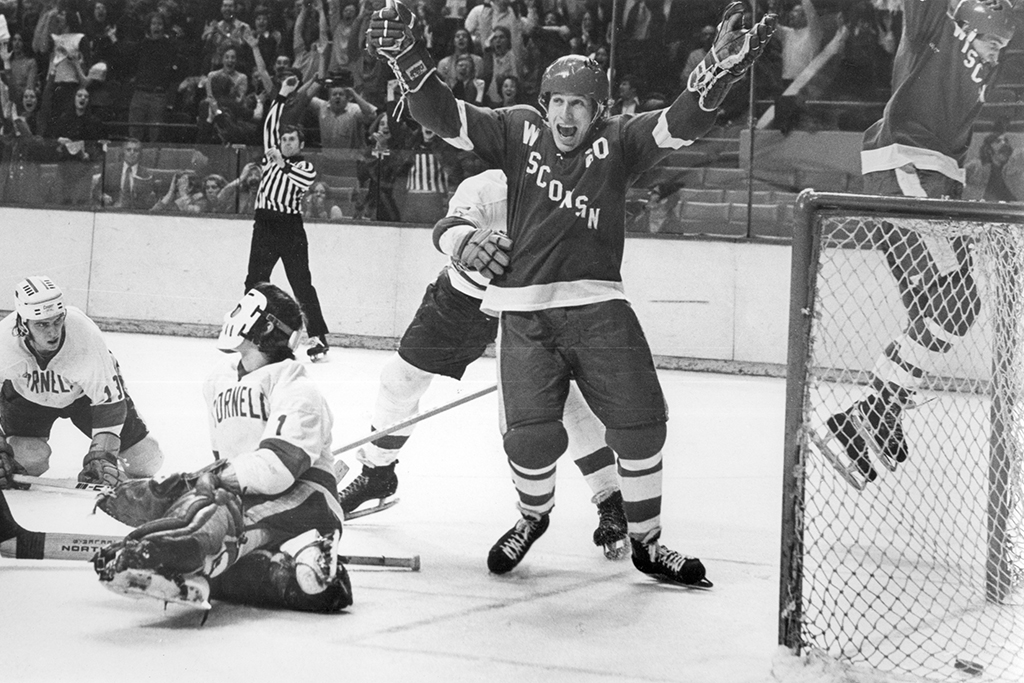
Talafous: “Nobody in college hockey had ever seen anything like that.” UW Athletics
Johnson was always upbeat but not the kind of coach to give impassioned speeches before games or between periods. Talafous says UW assistant coach Jeff Rotsch ’72, MBA’74 — a former team captain — told him later he’d asked Johnson if the coach had prepared a pregame pep talk against Cornell.
“If I have to give them a pep talk,” Johnson replied, “I have the wrong guys in that room.”
It would have been too late for a pep talk anyway when Cornell scored a devastating goal just 40 seconds into the third period, making the score 5–2. Marching Band director Mike Leckrone recalls UW athletic director Elroy Hirsch x’45 being too nervous to watch for more than a few seconds at a time, retreating instead to pace the Boston Garden interior.
The Badgers fought back gamely. Gary Winchester ’74 scored, and then Jim Johnston ’73 made it 5–4 with three and a half minutes left in the game.
With a little under a minute to play, Johnson pulled UW goalie Dick Perkins ’79 in favor of a sixth skater. It was Talafous. The Badgers hit the Cornell goal post with 18 seconds left — so close! — and then a Cornell player tried to clear the puck. But it hit Badger Dennis Olmstead x’76 and fell to the ice.
“I could see Olmstead was going to get to the puck,” Talafous says. “So then I’m trying to get open.”
Olmstead passed, and Talafous shot.
“I don’t think I ever really caught the puck,” Talafous says. “I kind of put it in, all in one motion.”
The goal tied the game at 5–5. There were five seconds left.
Talafous scored the game-winner in overtime, too, and then scored again two days later against Denver in a game the Badgers won 4–2 for their first NCAA championship.
Talafous plays down his own contribution and instead marvels at how “the fans, the band, and Bob Johnson’s personality” made that Boston weekend extra special.
“Nobody in college hockey had ever seen anything like that.”
Women’s Rowing, Varsity Eight National Rowing Championship
Lake Carnegie, Princeton, New Jersey — June 22, 1975
Women’s rowing was not yet an NCAA sport in 1975, but the National Women’s Rowing Association held a national championship that included both university teams and women’s rowing clubs. The Badgers, coached by Jay Mimier ’71, JD’74, had been to the championship a year earlier in California but drew a tough semifinal heat and didn’t make the finals.
Prior to the 1975 nationals in New Jersey, the Badgers competed in the Eastern Sprints in Connecticut. The varsity eight boat lost in the finals to Radcliffe. The UW novice (mostly freshmen) boat, however, had won its race impressively.
“Jay decided there was some speed in that novice boat,” says Sue Ela ’75, who was on the varsity eight boat and later became head coach of the Badger women. “He moved three women up to the varsity boat.”
The Badgers finished third in their semifinal race, good enough to make the finals but behind two club teams, the Vesper Boat Club of Philadelphia and the Eastern Development Camp of Boston. They were determined — and peaking at the right time — but at one point during the championships, Ela recalls, they had a reckoning with their coach.
“We were staying in the Princeton dorms, and we’d all gone out for some snacks. I had a chocolate malt, someone else had a six-pack of diet pop. It was all junk food.”
Mimier was incensed, questioning whether the team was ready to play with “the big dogs.”
“We didn’t think it was a big deal,” Ela says. “But it may have been the kick we needed to really focus.”
Moments before the final, Mimier gathered his rowers — besides Ela, they included a future U.S. rowing legend, Carie Graves ’76 — and quietly reminded them of how hard they’d trained. “You’re better than you showed in the heat,” he said.
The Badgers flew off the starting line for the 1,000-meter race. Where the usual strategy is to settle in at a slightly lower stroke rate, the UW women never settled, keeping up a torrid pace at 39–40 strokes a minute.
Near the finish line, it was tight, the UW holding the slimmest of leads over Vesper.
Seconds passed. Then: “We caught a crab,” Ela says, crew-speak for an oar sticking in the water. “It was a boat-stopper.”
To their immense relief, the Badgers discovered they’d already reached the finish, three seconds ahead of Vesper.
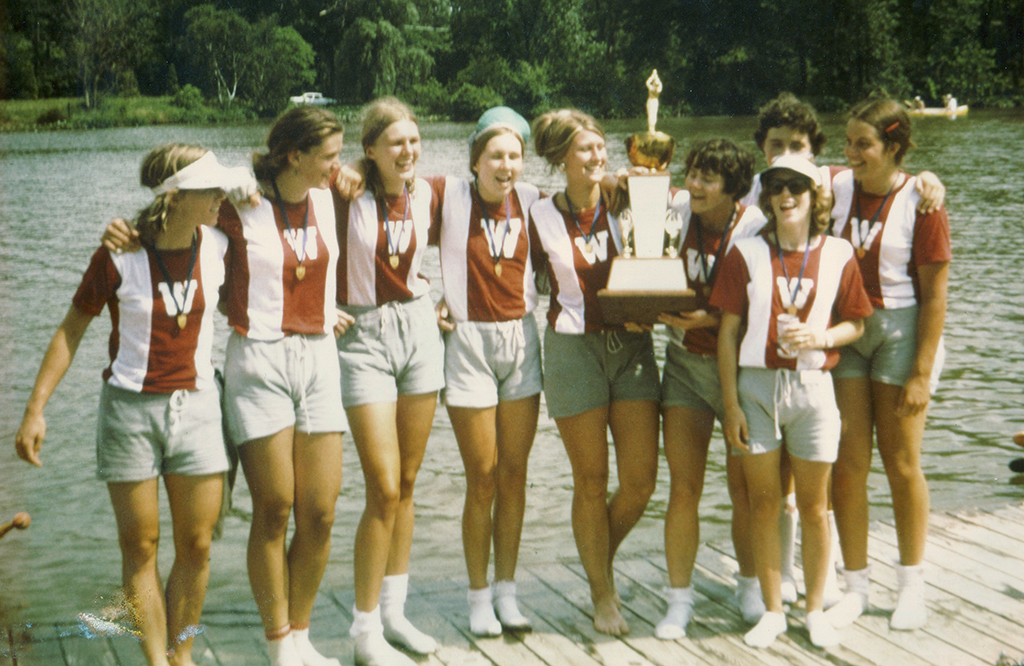
In a fraction of a second, the 1975 women’s rowing team went from thinking they’d lost to learning they’d won. UW Athletics
“In a fraction of a second we went from thinking we’d lost to learning we’d won,” Ela says.
It was the first national championship for UW women’s athletics.
Men’s Basketball vs. Michigan State
UW Field House — March 3, 1979
Earvin “Magic” Johnson and his Michigan State Spartan teammates came to Madison with an eye on the upcoming NCAA tournament, a national championship they would capture a few weeks later by beating Larry Bird and Indiana State in the final. The Spartans may have been looking past the UW, but they shouldn’t have. While the Badgers had struggled under Coach Bill Cofield that season — losing 10 straight games at one point — they’d won three straight going into the Michigan State game. And with just a few minutes left, it looked like they would make it four straight against the Spartans.
“We kind of had them,” recalls Bo Ryan, who was then an assistant coach and later a highly successful UW head coach.
The Badgers were up five with two and a half minutes left, but Ryan knew Johnson could perform magic. The UW had tried to recruit him. Two years earlier, when the Badgers were playing the Spartans in East Lansing and Johnson was a high school senior, Ryan arranged for the entire UW team to go to his high school gym and watch practice.
It was a recruiting tactic. Surely seeing the Badgers in his gym would get Johnson’s attention.
“He was so impressed I think he committed to Michigan State the next day,” Ryan says.
At the Field House in March 1979, Michigan State had whittled the lead to two with just three seconds to go when Badger Wes Matthews x’81 fouled Johnson.
“A terrible call,” Ryan says. “We were not very happy.”
According to Ryan, as Johnson was heading to the free-throw line, Badger Joe Chrnelich ’81 walked by and said, “Well, let’s see if you’re as good as they keep saying you are.”
“It’s kind of hard to rattle Magic,” Ryan says, chuckling. “Boom, boom — he made them both.”
Tie game. Three seconds left. Overtime for sure.
Except the Badgers quickly threw the ball in, getting it to Matthews, who launched an improbable Hail Mary shot from 50 feet.
It went in. Game over. Wisconsin 83, Michigan State 81. Pandemonium. The crowd rushed the court.
It was the last game Magic Johnson lost as a collegian.
Badger Football vs. Ohio State
Camp Randall Stadium — October 11, 2003
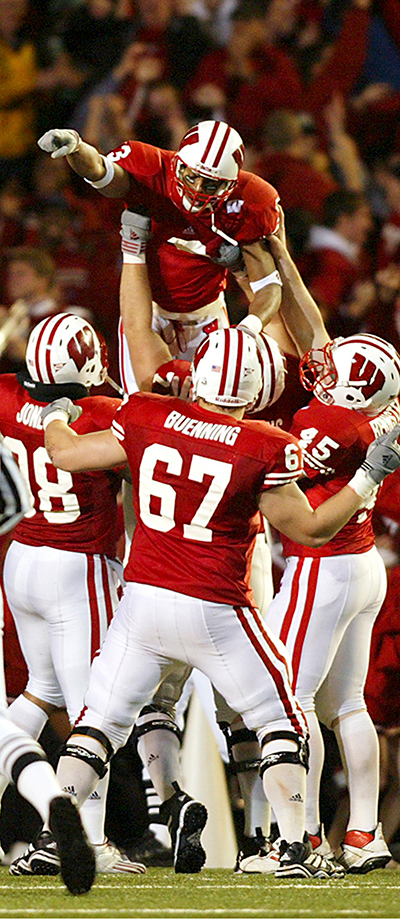
An Ohio State cheap shot fired up the Badger football team in a 2003 game that featured a dramatic fourth-quarter pass. UW Athletics/David Stluka
You wouldn’t think losing your starting quarterback late in the third quarter of a prime-time game against the team with the longest winning streak in college football could possibly work to your benefit. But the cheap shot Ohio State took at UW quarterback Jim Sorgi ’04 provided major motivation for the Badgers. A newspaper headline the next day read: “Shot on Sorgi fires up UW.”
Sorgi departed the field shortly after a linebacker for the third-ranked Buckeyes, who were riding a 19-game winning streak, grabbed the quarterback’s throat during a pileup. Having trouble breathing, Sorgi left the game. His replacement was Matt Schabert ’04.
“I spent my career as a backup,” says Schabert, today a Madison firefighter. “I can warm up pretty quickly. Just a few throws.”
It was 10–3 Wisconsin when Sorgi went down, but the Buckeyes scored with about six minutes left in the fourth quarter to tie the game at 10.
The Badgers had the ball on their 20 after the kickoff. Schabert had played well enough — he ran one quarterback draw for 12 yards — but now the game was on the line.
On second and nine from the 21, he took the snap and rolled right. Badger receiver Lee Evans ’14 was covered by Buckeye defensive back Chris Gamble, a matchup of stars. The pattern called for Evans to run downfield and cut to the outside. Gamble sensed the pass was imminent.
“Gamble thought the ball was coming on the out route,” Schabert says.
Instead, Evans made a second cut, sprinting directly up field.
Gamble had closed in for the expected out pass. “If you do that, Lee is going to run by you,” Schabert says.
The quarterback lofted a long, nearly perfect pass, which Evans caught in stride and took to the end zone. It was the game-winner, 17–10 Wisconsin.
Schabert sprinted 80 yards to celebrate with his receiver. “I was running toward the student section, the band, the cheerleaders. It was mayhem down there. It was a great feeling.”
Women’s Hockey vs. Harvard
Kohl Center — March 10, 2007
Mark Johnson ’94’s women’s hockey team had won their first national championship in 2006, but somehow the program had yet to really take off with fans as the Badgers tried to repeat in 2007.
Only 155 season tickets were sold. Yet the team performed brilliantly, losing only one game all year, and when the Badgers hosted Harvard in an NCAA quarterfinal game at the Kohl Center, the stars finally seemed to align.
A crowd of 5,125 was on hand, the second largest in college women’s hockey history at the time. The game was for a berth in the Frozen Four in Lake Placid, where 27 years earlier Johnson had helped the U.S. men’s team to a celebrated Olympic gold medal.
“It was an awesome atmosphere,” says Jinelle (Zaugg) Siergiej ’08, who was a junior forward for the Badgers.
The teams battled to a scoreless tie in regulation. Both goalies were brilliant, especially Harvard’s Brittany Martin, who stopped 67 shots overall.
Incredibly, there was no score in the first 20-minute overtime period. Or the second. Or the third! The teams had now played the equivalent of a second full game.
In the locker room early on, Siergiej says, Johnson was “very calm and collected. He was like, ‘This is fun. Next goal wins.’ But then as it went on, it was like, ‘I can’t believe this is still going!’
“We always had food between periods — bagels or fruit,” she continues. “We completely ran out after the second overtime. It was late, nothing was open. They brought in a big bag of Skittles. So the joke was we all ate Skittles and sugared ourselves up for the fourth overtime. We needed something.”
It worked. Seven minutes into the fourth overtime, Badger forward Sara Bauer ’08 sent a perfect pass to Siergiej near the right face-off circle.
“One of the things I learned from Mark was shoot every puck off the pass that you can,” Siergiej says. “I thought, ‘Get this thing on the net and don’t miss.’ ”
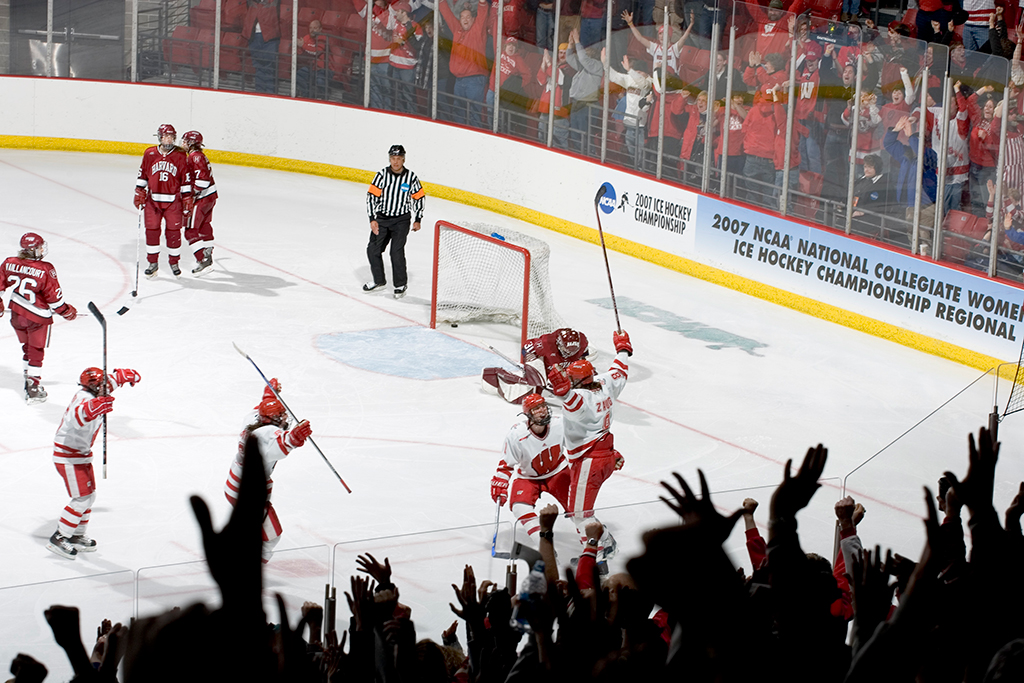
The women’s hockey team, sugared up on Skittles, won a game for the ages. UW Athletics/David Stluka
She didn’t. The Badgers won, 1–0, and went on to their second national championship. The game was the second-longest in women’s college hockey history.
Siergiej’s grandparents were there from Rockford, Illinois, up far past their bedtime. They saw a game for the ages. “Probably my favorite hockey memory,” Siergiej says.
Badger Volleyball vs. Nebraska
Nationwide Arena, Columbus, Ohio — December 18, 2021
Kelly Sheffield’s volleyball team had, in his words, “huge expectations” going into the 2021 season.
That can be a good and a bad thing. The Badgers were a group of talented veterans who had been to final fours twice before. When they arrived in Columbus for their third in a row — and having never won the NCAA championship — there was both anticipation and heightened pressure.
After the team beat number one Louisville in a five-set thriller in the semifinals, the championship match against number 10 Nebraska figured to be epic, and it didn’t disappoint.
“There were a lot of record-setting performances,” Sheffield says of the title match. “It was the largest crowd to see a college volleyball match. The most-watched match ever on TV. And just huge play after huge play after huge play.”
Sheffield’s stellar senior class — including Dana Rettke ’21; Sydney Hilley ’20, MS’22; Lauren Barnes ’21, MS’22; Giorgia Civita MS’22; and Grace Loberg ’21 — had finished seventh in the Big Ten as freshmen.
“Badger fans watched them grow up,” Sheffield says.
They grew to embrace the biggest stages in college volleyball, but a championship had eluded them. Now, in Columbus, they had one last chance.
Nebraska won the first set, the Badgers won the next two, and then Nebraska evened it at 2–2. In the fifth and final set, the UW led 14–12, one point from the championship, and appeared to win the next point, securing the title.
“We rush the court. We’re celebrating,” Sheffield says.
But Nebraska challenged the call, and the officials reviewed the play.
“It went against us,” Sheffield says. “That’s where having an experienced team was really helpful. You have to be able to lock in on the next point and do it again.”
They did. The rally went long on the next point. In the end, Hilley fed Rettke for the game-winner. It lives vividly in Sheffield’s memory.
“For the last swing to go Hilley to Rettke,” he says, “that was poetry.” •
Doug Moe '79 is a longtime Wisconsin journalist and author.
Published in the Winter 2023 issue
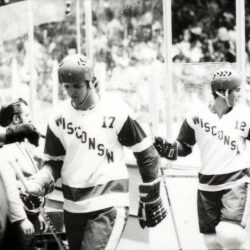
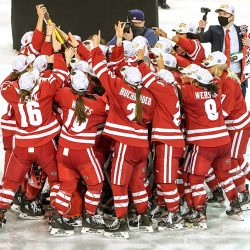
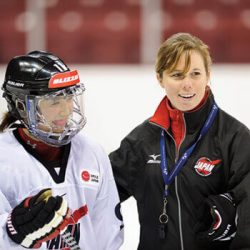
Comments
Michael Olson November 20, 2023
Nice work Doug!